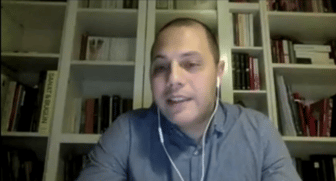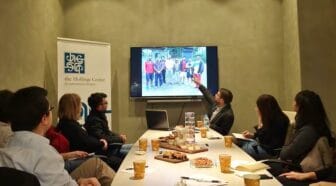Browse Topics
Categories
Format
Multimedia
Speakers Series

Turkey's Role in the Ukraine-Russia Crisis
Turkey is struggling to balance Ukraine on the one hand, with which it has been developing lucrative economic and military ties; and Russia on the other, which is a critical supplier of natural gas and a significant trade and security partner. Complicating this balancing act even further are Turkey’s commitments to NATO, juxtaposed with President […]

Afghanistan's Transition - A Critical Approach
As the last U.S. troops withdrew from Afghanistan on August 31st, many questions remain about the future of Afghanistan and its relations with the international community. The takeover by the Taliban has implications for the country's internal stability and security, as well as for neighboring countries and beyond. What went wrong? What should we expect in Afghanistan next? What will be the global consequences of Afghanistan's transition? To discuss these issues and to look back on the current history of Afghanistan, the Young Professionals in International Relations talk series hosted Haluk Karadağ, assistant professor at Başkent University in Ankara, Turkey, on September 15, 2021.

Iran's Raisi Era
Iran held elections at a critical time in terms of itself, its region, and the balance of power in the world. Ibrahim Reisi, the former head of the Judiciary, who is a close circle of the spiritual leader Ayatollah Ali Khamenei, has become the new president of the Islamic Republic of Iran. How can the […]

Youth, Peace and Security Nexus: Perceptions Toward Youth
From global climate change demonstrations and strikes to protests against ruling elites, corruption, and inequality, the world witnessed mass youth protests in the last year. Despite youth’s remarkable political mobilization, their messages are often devalued or ignored. This is mainly related with the contradictory perceptions of youth as being ‘troublemakers’ or ‘victims’, or ‘agents of […]

YPIR Series: Beyond Energy - Turkey and the New Geopolitics of the Eastern Mediterranean
Tensions are high in the Eastern Mediterranean. Against the backdrop of natural gas discoveries and the persistent disputes over drilling rights, the geopolitical landscape of the Mediterranean has been shifting for a decade now. As regional states with shared interests rebalance, and alliances are reshuffled, Turkey’s political and military footprint grows more visible across the […]

COVID-19 Response in LDCs and Conflict Zones
Why are least developed countries (LDCs) and conflict zones particularly vulnerable to the COVID-19 pandemic? Has there been adequate attention given to the needs of war-affected populations and LDCs during this crisis? Why is helping LDCs and war-affected communities particularly important in the global fight against the coronavirus pandemic? To answer these questions and to […]

YPIR Series: Battling the 'Infodemic'
The COVID-19 pandemic created what the World Health Organization has called an ‘infodemic’ – massive amounts of misinformation passing through the airwaves and billions of social media feeds every day. In times like these, people need information to be accurate, cross-checked, and useful, as this can literally save lives. During a virtual meeting of the […]

YPIR Series: Hyper-connectedness and the New Order
Dr. Salih Bıçakcı of Kadir Has University was the speaker at the year-end meeting of the Young Professionals in International Relations network. Dr. Bıçakcı talked about how hyper-connectivity through technology and increased dependence on artificial intelligence (AI) create new paradigms, influencing (mostly unbeknownst to us) decision-making from the personal to the interpersonal all the way […]

YPIR Series: Noah Coburn on "Lesser Known Actors of the War in Afghanistan"
Noah Coburn, political anthropologist at Bennington College, presented his current ethnographic research on Nepalese contractor employees to members of the YPIR network. Coburn has been interviewing people from Nepal, Georgia and Turkey, who have worked for contractors in Afghanistan during or after the war. He shared with YPIR members the socioeconomic profiles of his interviewees, […]

YPIR 2015 Year-End Review: Open Forum
Members of the Young Professionals in International Relations (YPIR) network gathered for an open forum at the end of the year to share their perspectives of the important international relations events of 2015. Participants included university professors and researchers, NGO members, academic journal editors, and diplomats. The main topics of the evening were the climate […]
A non-profit, non-governmental organization dedicated to fostering dialogue between the United States and countries with predominantly Muslim populations in the Middle East, North Africa, South Asia, Eurasia and Europe
Stay Informed
Subscribe to our mailing list to stay up to date on our latest information.